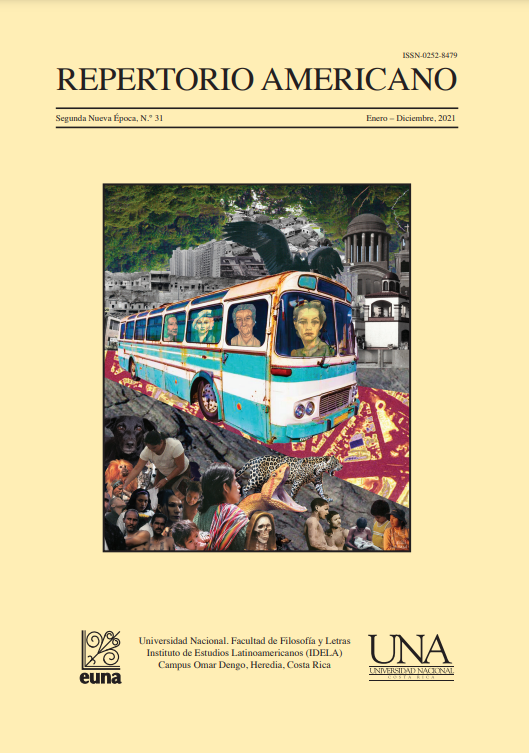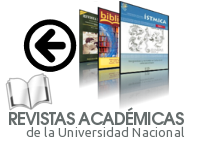Violent disruptions: Victorian Warnings & Fascination for a Dystopian and Inorganic Society which Became the Anthropocene
DOI:
https://doi.org/10.15359/ra.1-31.4Keywords:
Anthropocene, Victorian Literature, ecology, amorality, progress, violenceAbstract
While the Victorian Era has been analyzed as a period of slavery, colonialism, and race based on self-adjudicated supremacy, little thought has been given to the ecological implications of such imperialism and the warnings literary works presented such as Robert Louis Stevenson’s The Strange Case of Dr. Jekyll and Mr. Hyde. This essay aligns itself with a body of literature that looks retrospectively at Victorian literature through the lenses of the geological time known as Anthropocene since, as proposed by Taylor, “Victorian studies in the Anthropocene […] align with the historical period during which the Anthropocene emerged” (574). By analyzing Stevenson’s The Strange Case of Dr. Jekyll and Mr. Hyde, one may assert that it identifies warnings to the shift towards industrialization that impend in the Victorian era, and it offers possible implications for such a shift. Additionally, it makes acute emphasis on the novella’s imagery as redolent of a fascination for dystopianism, which is articulated, we argue, through the (self)-monster making of Dr. Jekyll. Hence, this paper is divided in three main sections. The first one is an introduction to the historical context that took place before Victorian times, making an emphasis on the transition from the Romantic, pastoral England when Romantics “recognized no radical separation between self and nature” (Reed 364) to the industrial, utilitarian England (Dimmock). The second section deals with illustrations and arguments of ecologically-monstruous behaviors of Victorian times materialized in The Strange Case of Dr. Jekyll and Mr. Hyde. Lastly, the third section addresses (a) moral issues during said Victorian times, which might, in turn, become unheeded warnings for generations to come.
References
Aslami, Zarena. "Living in a Biopolitical World." Victorian Literature and Culture, vol. 47, no. 3, 2019, pp. 679-689, doi:10.1017/S1060150319000123.
Brantlinger, Patrick. Victorian Literature and Postcolonial Studies. Edinburgh University Press, Edinburgh, 2009, pp. 1-54.
Corton, Christine L. London Fog: The Biography. Harvard University Press. 2015, www.hup.harvard.edu/catalog.php?isbn=9780674979819.
Darwin, Charles. On The Origin of Species by Means of Natural Selection, or Preservation of Favoured Races in the Struggle for Life. London: John Murray, 1859.
Dickens, Charles. A Tale of Two Cities. Canterbury Classics, 2020.
Dimmock, Mark, and Fisher, Andrew. “Chapter 1. Utilitarianism.” Ethics for A-Level: For AQA Philosophy and OCR Religious Studies.” Open Edition Books, Open Book Publishers, 2017, pp. 11-28, books.openedition.org/obp/4419
Fleming, Jim. "Excuse Us, While We Fix the Sky: WEIRD Supermen and Climate Engineering. In: ‘Men and Nature: Hegemonic Masculinities and Environmental Change,’” edited by Sherilyn MacGregor and Nicole Seymour. RCC Perspectives: Transformation in Environment and Society, no. 4, 2017, pp. 23-28, doi.org/10.5282/rcc/7979.
Griffiths, Devin, and Deanna K. Kreisel. "Introduction: Open Ecologies." Victorian Literature and Culture, vol. 48, no. 1, 2020, pp. 1-28, doi:10.1017/S1060150319000470.
Hillard, Molly C. "Neo-Victorian." Victorian Literature and Culture; Victorian Literature and Culture, vol. 46, no. 3-4, 2018, pp. 780-783, ProQuest, doi:10.1017/S1060150318000827.
Hoare, Phillip. “Fog Is Transcendent. It Muffles Our World, and Inspires Our Artists.” The Guardian, Guardian News and Media, 2 Nov. 2015, www.theguardian.com/commentisfree/2015/nov/02/fog-artists-autumnal-dickens-constable-turner, accessed 29 Feb. 2021.
Hume, Robert D. “Gothic versus Romantic: A Revaluation of the Gothic Novel.” PMLA, vol. 84, no. 2, 1969, pp. 282–290. JSTOR, www.jstor.org/stable/1261285. Accessed 11 Mar. 2021.
Manning, Pascale M. "The Hyde we Live in: Stevenson, Evolution, and the Anthropogenic Fog." Victorian Literature and Culture; Victorian Literature and Culture, vol. 46, no. 1, 2018, pp. 181-199, doi:10.1017/S1060150317000389.
Merchant, Carolyn. The Death of Nature: Women, Ecology and the Scientific Revolution. HarperCollins/ HarperOne, 40th Anniversary Ed., Kindle ed., New York, N.Y, 1980.
---. "The Scientific Revolution and The Death of Nature." Isis, vol. 97, no. 3, 2006, pp. 513-533, doi:10.1086/508090.
National Geographic Society. “Anthropocene.” Resource Library Encyclopedic Entry, www.nationalgeographic.org/encyclopedia/anthropocene/. Accessed 10 Mar. 2021.
Patriquin, Larry. “The Agrarian Origins of the Industrial Revolution in England.” Review of Radical Political Economics, vol. 36, no. 2, June 2004, pp. 196–216, Sage Journals, doi:10.1177/0486613404264190.
Reed, John R. “Inherited Characteristics: Romantic to Victorian Will.” Studies in Romanticism, vol. 17, no. 3, 1978, pp. 335–366. JSTOR, www.jstor.org/stable/25600141. Accessed 11 Mar. 2021.
“Routledge Library Editions: Wordsworth and Coleridge.” RLE: Wordsworth and Coleridge – Book Series - Routledge & CRC Press, www.routledge.com/RLE-Wordsworth-and-Coleridge/book-series/RLEWAC.
Robinson, Bruce. “History - British History in Depth: All Change in the Victorian Age.” BBC, BBC, 17 Feb. 2011, www.bbc.co.uk/history/british/victorians/speed_01.shtmlAccessed 11 Mar. 2021
Scott, Heidi C. M. "Industrial Souls: Climate Change, Immorality, and Victorian Anticipations of the Good Anthropocene." Victorian Studies, vol. 60, no. 4, 2018, pp. 588-610, doi:10.2979/victorianstudies.60.4.04.
Shelley, M. Frankenstein, or The Modern Prometheus. Penguin Books, 2003.
Sloan, Phillip, "Darwin: From Origin of Species to Descent of Man," The Stanford Encyclopedia of Philosophy, Summer 2019 Ed., edited by Edward N. Zalta, plato.stanford.edu/archives/sum2019/entries/origin-descent/.
Stevenson, Robert L. The Strange Case of Dr. Jekyll and Mr. Hyde. E-book, Floating Press, 2008.
Taylor, Jesse O. "Anthropocene." Victorian Literature and Culture; Victorian Literature and Culture, vol. 46, no. 3-4, 2018, pp. 573-577, doi:10.1017/S106015031800027X.
T.E. Jordan. Studies in the Quality of Life in Victorian Britain and Ireland. Springer Briefs in Well-Being and Quality of Life Research, 2013 doi:10.1107/978-94-007-6122-3_3.
Published
How to Cite
Issue
Section
License
Las cartas de entendimiento se facilitarán a las personas autoras al momento de aceptación de su trabajo para publicarse.
Todos los contenidos son de libre acceso con sólo citar la fuente.







